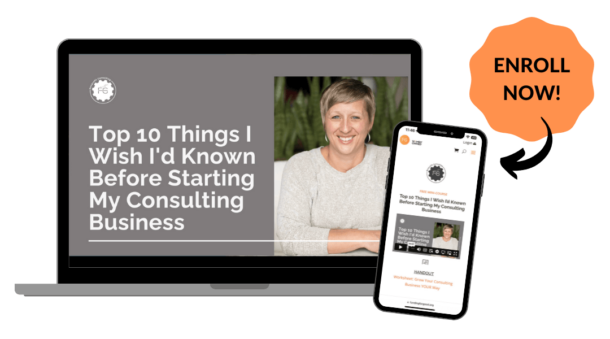Most nonprofit consultants find their first clients before they have a website. Many of us also start consulting before we even have a business name!
But eventually, most consultants need a business name and a website.
Think of your website as your digital business card. It’s how potential clients get to know you, what you do, and what makes your services so valuable.
So whether you’re pondering your first website—or sprucing up your current website—here are five key elements to include.
1) One or More Pages That Describe What You Do
When a potential client lands on your website, you want them to immediately know what you do and who you work with.
It sounds simple, right? Unfortunately, if you look at other nonprofit consultants’ websites, you’ll quickly realize this is not as easy as it sounds.
Before you can describe what you do to others, you need to know what you do and the value it provides your clients!
This is something we help a lot of nonprofit consultants refine through our one-on-one Boot Camp program. Many Boot Camp clients need help choosing, refining, pricing, and describing their services.
One thing we talk about a lot is communicating the value of the services you provide, rather than just listing activities.
For example, if you do grant research and write grants, what value are you delivering for your clients? You’re helping nonprofit clients build a viable grant funding pipeline, saving them time, and freeing up staff to focus on the mission rather than getting lost digging through grant databases.
If you’re a grant writer, you’re helping clients put their very best foot forward to current and new funders. You’re also saving them tons of time (and saving money by not having to hire a full-time grant staffer), bringing a fresh perspective to their written materials, and helping them speak more effectively to different donor audiences.
Many consultants include one or more services pages on their website, which is great! But you also want to be sure that your home page, services page (or pages), and About page all consistently convey your mission and your work.
2) A Compelling About Me Page
Let’s be honest, most consultants run out of steam by the time we get to writing our About page. So, we slap up a picture and a hastily updated bio and call it a day.
Unfortunately, clients today are looking for a lot more than a resume or bio.
When people visit consultants’ websites, a surprising number will check out your About page.
Potential clients want to know what you are “about.”
They want to know your experience and qualifications (without having to read a dry resume).
They want to know what drives you to do the work you do. (Yet another opportunity to share your services!)
And they want to get a good sense of what it’s like to work with you—and whether you would be a good fit for their organization. Are you buttoned up? Are you blunt and straightforward? Are you fun and casual? Are you passionate about specific causes or approaches?
Make sure your business personality and work style shine through.
3) A Contact Me Page and Form
Once they’re inspired by your About page and services, you want potential clients to be able to contact you as easily as possible. Be sure to include your business email address on your site as well as a simple contact form.
Keep in mind that the more fields your form has, the fewer people will complete it and hit submit. Luckily, you can adjust your form over time, adding more fields to vet potential clients if you start getting too many contacts that aren’t a great fit.
4) Email List Signup
If you are interested in selling courses, running webinars, or selling other products (aka passive income), you need an email list.
If you’re working with a website developer, ask them to set this up for you. If you’re creating your website yourself, some platforms (like Wix) have built-in list management tools while others (like WordPress) will require integrating a third-party mailing list tool (like MailChimp or Constant Contact).
5) Site Indexing
Many consultants work with web developers to build beautiful sites that never get “indexed” for search. Why is this a problem?
If your site isn’t indexed, it cannot be found online unless someone types in the exact address!
When it comes to search engines, Google dominates, so you will want to start there. If you’re working with a web developer, ask them to create a Google Search Console account and be sure all pages of your site are indexed. If you’re doing it yourself, you can do a quick search for “Google Search Console indexing” and add the name of the website platform you are using (such as Wix or Squarespace). You should be able to find clear instructions online.


